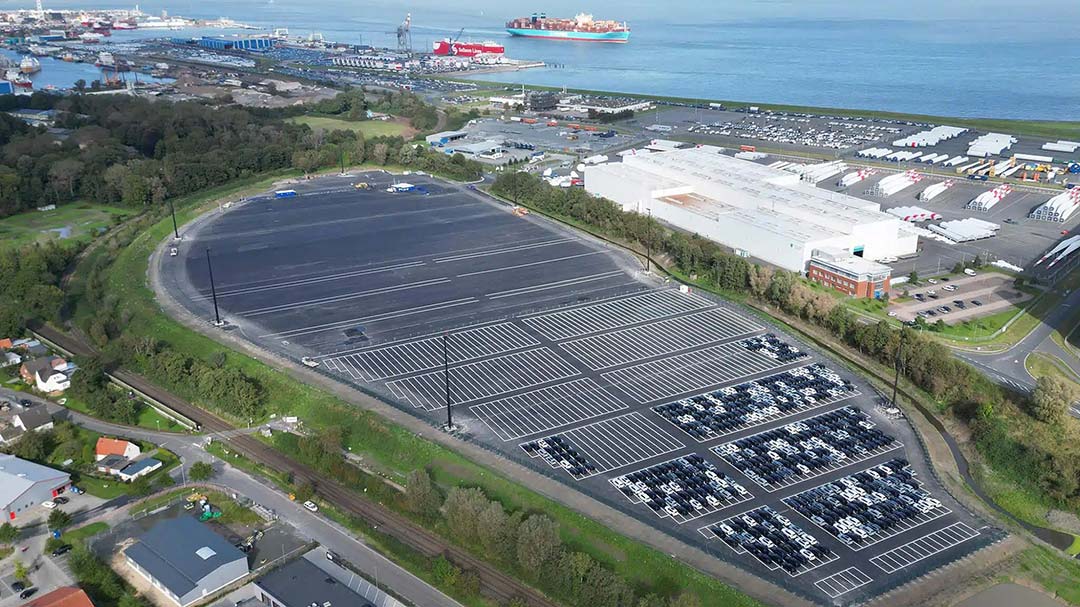
Sebastian Reimann
Mosolf can handle cars – and in the future, logistics services for much larger vehicles will also increasingly be part of the offering. For cranes and tunnel boring machines, for example. The automotive specialist is pushing into the high & heavy business and project logistics. CEO Jörg Mosolf revealed this to DVZ on the fringes of the BVL Supply Chain CX in Berlin.
Specifically, the company is investing in multi-purpose terminals in European seaports in order to be able to handle such oversized goods from companies such as Liebherr or Herrenknecht and to supplement the existing range of services for RoRo goods.
The medium-sized company has leased a corresponding space in the Inner Harbour in Wilhelmshaven for eight years – not far from the existing 150,000 square meters of RoRo space. The multipurpose terminal can already be used operationally, but is still being expanded and will be completely finished next summer, Mosolf announced.
The entrepreneur has also already signaled his interest in possible sites as part of the planned expansion of the Jade-Weser Port. In his estimation, this could happen in five to eight years. Mosolf is currently working on a study that will be available at the end of the year and should quantify the specific capacity requirements, including in the container segment. “This is a prerequisite for planning approval,” he says.
Its aim is to establish a kind of multi-purpose terminal network in Europe with locations in Wilhelmshaven, but also in the western ports and in southern Europe. In Zeebrugge, the company is therefore planning to rent space for 15 years as part of an existing joint venture. And in Koper, Mosolf has just founded a company for the business segment and is negotiating with partners such as the Port of Koper to establish corresponding capacities there as well as a hinterland organization. Depending on demand, further locations could arise through cooperation with shipping companies such as Polaris or NYK, with whom the service provider has been working for some time.
The increased involvement should also be seen in the context of the acquisition of Bremen-based freight forwarder Transport Overseas Group, which was completed retroactively at the beginning of the year. According to Mosolf, the latter also has expertise in the breakbulk and project business, which could result in synergies. “Basically, we want to expand our activities along the supply chain and serve areas that are not part of the RoRo segment,” says Mosolf. However, in order to be able to achieve this, he believes that it is also necessary to have access to these areas. Hence the corresponding investments in the terminals.
Meanwhile, a profound change is taking place in its core business of automotive logistics. The industry has just been startled by the announcement from Germany’s largest car manufacturer VW that it intends to close three factories. Dresden, Emden and Osnabrück have recently been named as possible candidates for closure. However, this has not yet been decided. Mosolf did not comment explicitly on VW to DVZ, but has a clear opinion on what is needed to make the German automotive industry more efficient again: lower costs, higher productivity and better products.
According to the entrepreneur, interesting markets for automotive logistics companies are also emerging elsewhere. He cites Saudi Arabia as an example, where his company is currently developing hinterland logistics via a joint venture with Bahri Logistics. This is because car factories are being built there in four locations, for example by Lucid Motors or Hyundai. “In addition, around 500,000 to 700,000 cars are registered in Saudi Arabia every year. That is roughly equivalent to the market volume of Spain,” says Mosolf.
Do you have a special request?
Contact us if you would like to learn more about the efficiency of German logistics!